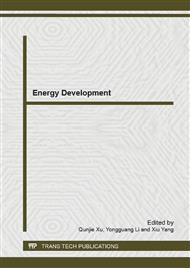p.1857
p.1862
p.1867
p.1877
p.1881
p.1886
p.1891
p.1895
p.1901
The Comprehensive Efficiency Evaluation of Electrical Power System of China Based on Data Envelopment Analysis
Abstract:
With the power system of China continuous expanding recently, the electric power generation, transmission and supply capacity increased dramatically. In order to improve economic operational efficiency and realize scientific development, the Input-Output efficiency between the input of the power system facilities and the output of the power supply becomes a critical issue that government, business and academia have to face up to. In this paper, we used the DEA (Data Envelopment Analysis) model and tested the Input-Output efficiency of power system development and study the trend of important development segment. The relative efficiency of power system is closely related to the electricity management system and economic situation, the elements of reduce the efficiency were been found out by analyzing the DEA results. And a series of suggestions were proposed to increase the comprehensive efficiency.
Info:
Periodical:
Pages:
1881-1885
Citation:
Online since:
December 2013
Authors:
Price:
Сopyright:
© 2014 Trans Tech Publications Ltd. All Rights Reserved
Share:
Citation:


